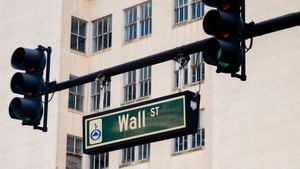Local Washington officials are bracing themselves for what many believe could be another tumultuous term under former President Donald Trump. Following his electoral victory and the backing of a Republican-controlled Congress, the political atmosphere is buzzing with uncertainty, as D.C. leaders prepare for the challenges they expect will arise from Trump's return to the White House.
During his first presidency from 2017 to 2021, Trump’s relationship with Washington, D.C., was marked by chaotic exchanges and dramatic confrontations, leading many local officials to reference the potential for more confrontations.
Mayor Muriel Bowser and the city council are playing their cards close to the vest, aiming for conciliatory tones even as they gird for battles on the horizon. Bowser succinctly pointed out the importance of planning, saying, “We have been discussing and planning for many months in the case the District has to defend itself and its values.”
This proactive approach has manifested in direct communications with Trump’s team since the electoral fallout. While they expressed interest in meeting and discussing priorities, Bowser indicated they had not yet received any response.
Expectations for Trump's second term differ starkly among local officials as they navigate the memories of confrontational moments from his first presidency. These included significant instances like the backlash against Trump's proposal for military parades down the National Mall or the scathing critiques of local governance during mass protests.
Local council member Christina Henderson expressed the weight of the current situation, noting, “We just have to do our best and hold on for another few years. We have to figure out how to make it work.” With many constituents vigorously watching, Henderson acknowledges the unpredictability of Trump’s intentions, but remains hopeful based on experiences from his first term.
Compounding worries for District officials is the limited autonomy afforded to Washington, D.C., under Home Rule authority, which permits Congress to oversee and, if necessary, overturn local laws. This means the whims of congress members can have immediate and direct impacts on the local governance and its judicial processes. Henderson pointed out the precarious balance between local governance and congressional oversight as they prepare for upcoming challenges.
During Trump’s absence from power, local officials had hoped for some reprieve from the constant scrutiny of Congress members who often summoned them to testify over various concerns, including crime rates. Yet, such concerns could return with renewed vigor as Trump’s administration has historically found support among some members of Congress who align with his agenda.
Adding to local officials’ apprehensions, examples of congressional encroachment during Trump's last term continue to linger. A notable illustration of this occurred when Democrats and President Biden canceled sweeping revisions to the D.C. criminal code—an action fueled by persistent critiques from House Republicans. This prompted anguish among local officials who felt undermined.
Council member Charles Allen spoke to the potential consequences of annual budget riders, which are often leveraged by Congress to manipulate D.C. laws. Allen articulately expressed concerns over manipulation stating, “Without statehood, without autonomy, our laws are always more at risk than any other Americans.”
The anticipated power dynamics under Trump suggest these tensions could escalate. Calls for radical proposals have already been initiated, including suggestions to abolish the D.C. mayor's office and repeal the Home Rule Act. This, mixed with the traditional push by Republicans to intervene with D.C. governance, raises serious alarms for local lawmakers.
Despite the challenging political terrain, Mayor Bowser seeks common ground linking potential collaborations with Trump over the return of federal employees to the office. “I look forward to discussing” this mutual objective, she expressed. Remarkably, both sides agree on the need to call back federal workers post-pandemic, even as other, more contentious issues remain unresolved.
All implemented measures come at the backdrop of expectations for D.C. governance and its intersection with federal authority. D.C. residents and local politicians alike are gearing up for another four years of potential push-and-pull, glaring observation, and spirited debate as they await Trump’s next chapter as president. The consensus among D.C. officials is clear: no matter the outcomes of negotiations or discussions, they remain committed to advocating for the city’s needs and autonomy.



